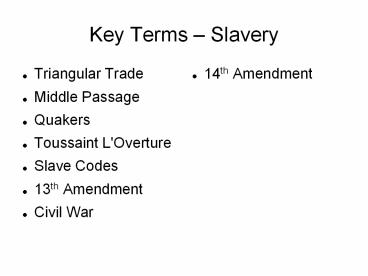Key Terms - PowerPoint PPT Presentation
1 / 11
Title:
Key Terms
Description:
Key Terms Slavery Triangular Trade Middle Passage Quakers Toussaint L'Overture Slave Codes 13th Amendment Civil War 14th Amendment Triangular Trade In the 18th ... – PowerPoint PPT presentation
Number of Views:108
Avg rating:3.0/5.0
Title: Key Terms
1
Key Terms Slavery
- Triangular Trade
- Middle Passage
- Quakers
- Toussaint L'Overture
- Slave Codes
- 13th Amendment
- Civil War
- 14th Amendment
2
Triangular Trade
- In the 18th Century, ships traveled in a
triangular route which was broken into three
legs. - In the first leg, ships would leave New York or
Boston and sail to Western Africa. - Rum and iron were traded for gold and slaves.
3
The Middle Passage
- The second leg of the triangle would be known as
the Middle Passage. - Middle Passage ? leg of the triangle that brought
the enslaved Africans to the West Indies and the
Caribbean where they were exchanged for molasses.
4
Middle Passage (cont.)
- The Middle Passage was by far the worst for the
slaves. - They were chained in place, poorly fed and abused
in many cases. - On the last leg of the trip, the molasses was
taken back to New York and converted into rum.
5
Slavery in the West Indies
- Slaves were put to work on the sugar plantations.
- Survivors of the work on the sugar plantations
were usually resold as 'seasoned' slaves.
6
Speaking Out Against Slavery
- Quakers ? Puritanical group that petitioned
England to outlaw slavery. - Many people wrote about the horrors of the Middle
Passage which helped in bringing the abuses of
slavery to light.
7
Revolt in Haiti
- Toussaint L'Overture would lead a revolt against
his French captors and help free them from
colonial rule. - Overture himself would die of yellow fever
eventually but his example would serve as a
cautionary tale to other slave-using countries.
8
Results
- The British would outlaw the slave trade in 1807
out of fear of a crippling uprising. - The British would end slavery altogether in 1834
on the basis of its immorality. - France freed its slaves in 1848.
- Spain waited until 1873 to free its slaves in
Puerto Rico and 1888 to free them in Cuba
9
Slavery in North America
- Slaves from Africa arrived in Virginia in 1619.
- Workload would be manageable until the growth of
the cotton trade. - With the advent of the cotton trade, slavery
became worse in America.
10
Slavery in North America
- Slaves outnumbered their Southern masters by a
large amount and due to this growth the Slave
Codes were passed. - Slave Codes ? laws that prohibited slaves from
owning weapons, learning to read, meeting in
groups and going anywhere without permission.
11
Results
- The U.S. Constitution would prohibit the slave
trade in 1808 but it would not be until the Civil
War when slavery would end. - Civil War ? war fought between the Northern
territories and Southern territories (Union and
Confederacy respectively) from 1861-1865. - 13th Amendment ? ended slavery in the U.S..
- 14th Amendment ? granted due process to former
slaves. - 15th Amendment ? gave African-Americans the right
to vote.































